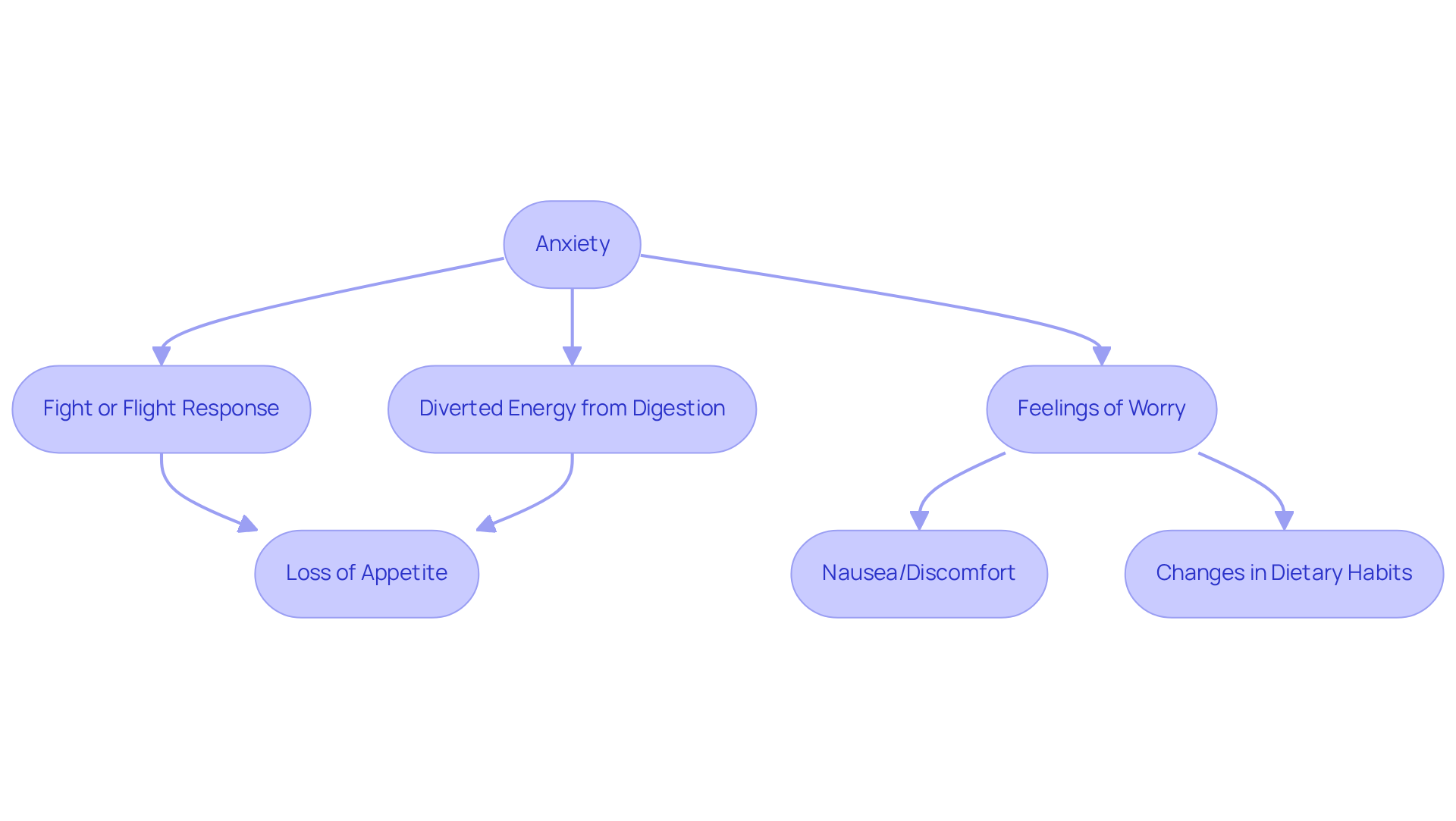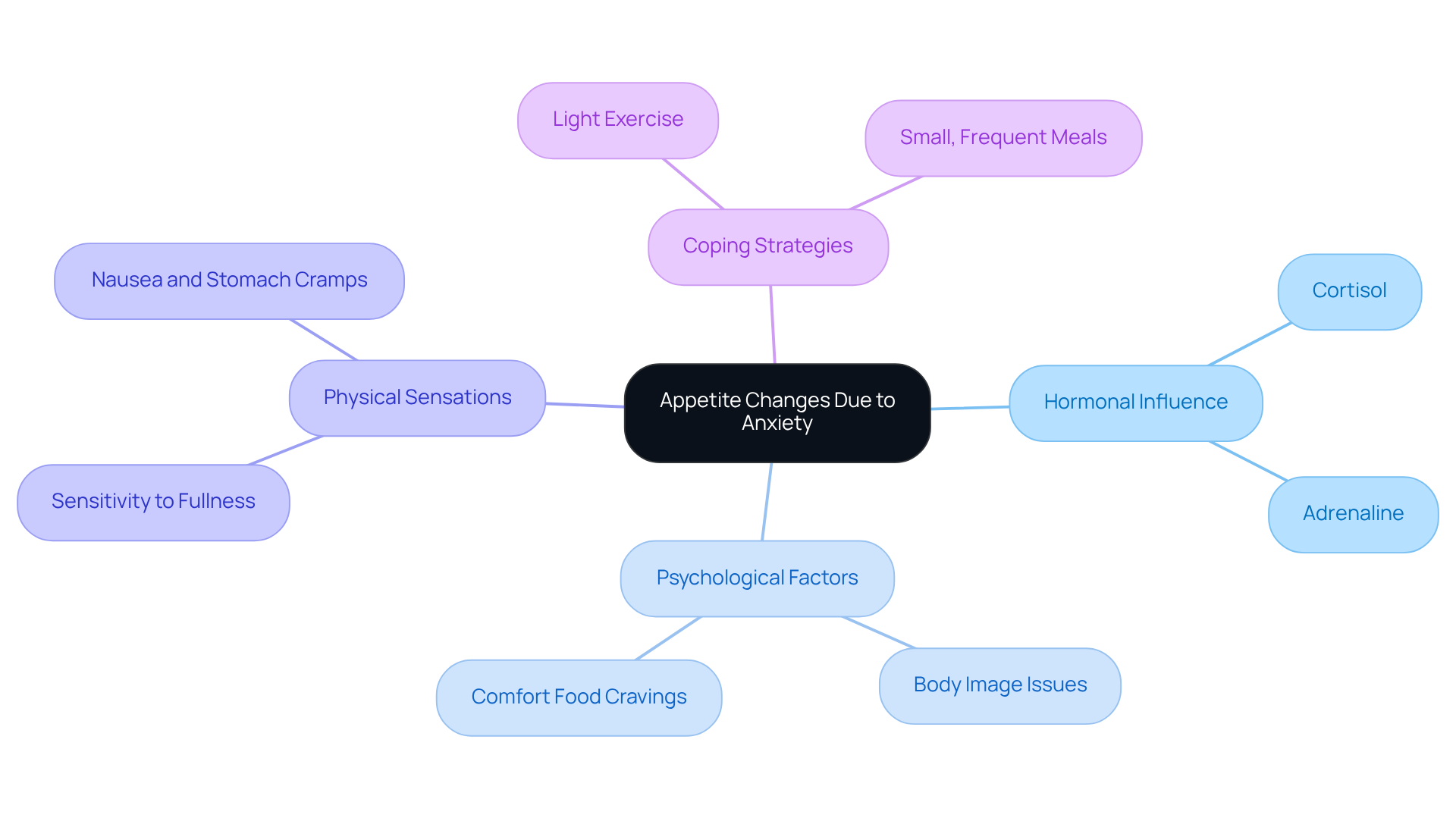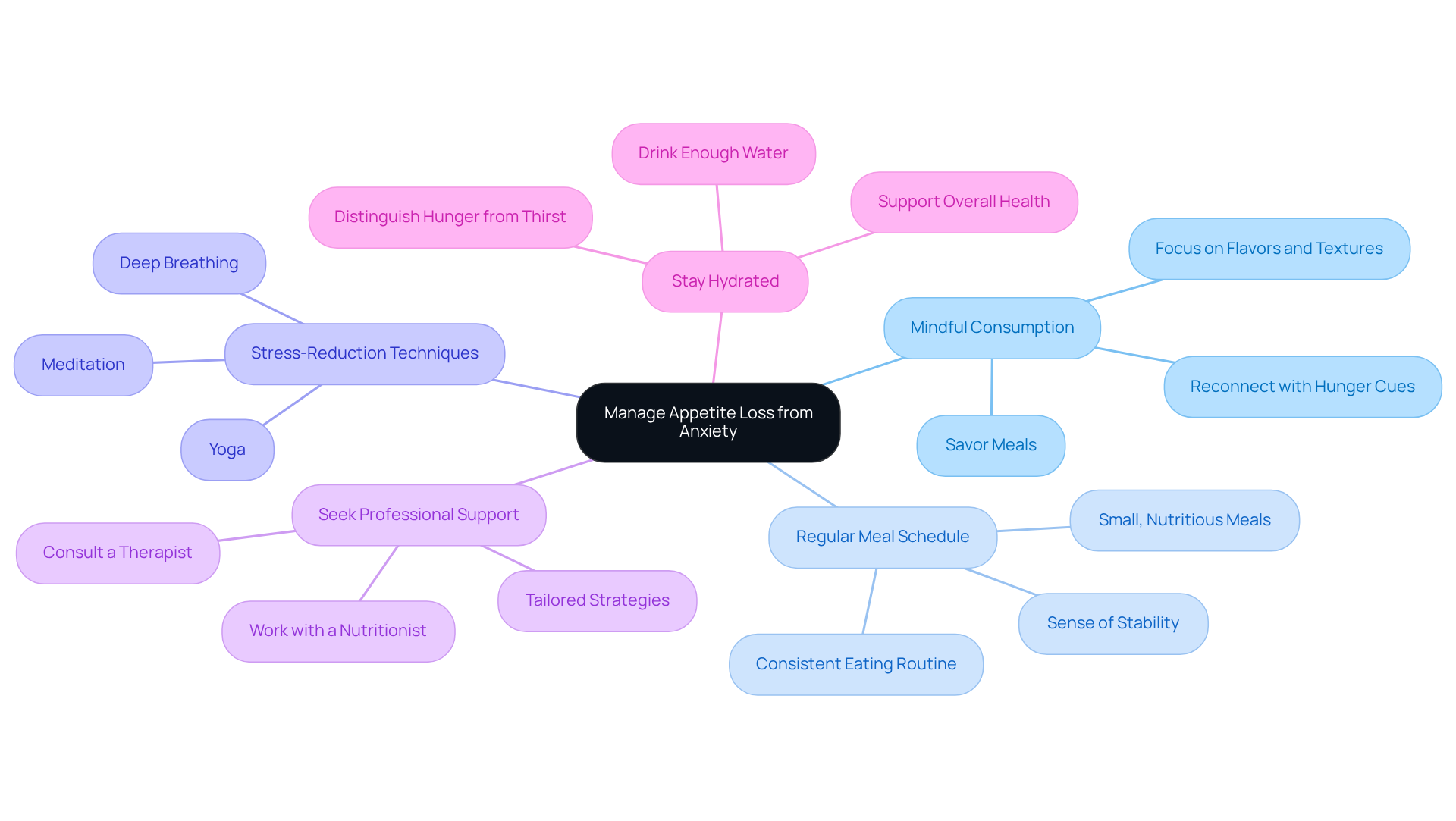Overview
Anxiety can indeed lead to a loss of appetite. This occurs as it triggers physiological responses, such as the release of stress hormones, which interfere with hunger signals and disrupt digestion.
Have you ever felt overwhelmed by anxiety, perhaps experiencing nausea or discomfort that makes eating difficult? Understanding this connection is crucial, as heightened anxiety can significantly impact your emotional and physical health.
By recognizing these effects, you can take steps towards managing them effectively. Remember, it’s important to seek support when you’re feeling this way. You don’t have to navigate this alone; reaching out for help can be a powerful step towards healing.
Introduction
Anxiety can often feel like a relentless storm, disrupting not only our emotions but also our physical well-being, including our appetite. Understanding the intricate relationship between anxiety and loss of appetite opens up a deeper opportunity for individuals to address their mental health and nutritional needs.
How does this emotional turmoil manifest in our eating habits?
What strategies can we employ to regain control over our relationship with food?
Exploring these questions illuminates paths toward healing and resilience, making it clear that managing anxiety is not just about coping; it’s also about nurturing our bodies.
Explore the Link Between Anxiety and Appetite Loss
Anxiety is a common emotional reaction that can lead us to wonder, can anxiety cause loss of appetite, significantly affecting our eating habits. When faced with stress, our bodies often enter a heightened state of alertness known as the 'fight or flight' response. This physiological reaction prioritizes immediate survival, which raises the question of as energy is diverted away from digestion. Have you ever experienced this? Feelings of worry can also induce nausea or discomfort, making it even more challenging to eat. Recognizing this connection is crucial for those who may not fully understand how their emotional struggles, including the question of can anxiety cause loss of appetite, impact their food choices. This awareness is the first step toward effectively addressing the issue.
Research shows that individuals with anxiety-related conditions frequently report changes in their dietary habits, raising the question of whether can anxiety cause loss of appetite, which can lead to unplanned weight loss and nutritional deficiencies. A study published in the British Medical Journal indicates that those consuming high levels of ultra-processed foods are at a 20 to 50% increased risk of experiencing depressive symptoms. This further complicates their mental health and eating habits. By understanding this connection, you can gain valuable insights into your experiences and seek the appropriate support to manage both your distress and its physical manifestations. This holistic approach is essential for fostering resilience and promoting overall well-being. As we explore this further, remember that seeking help is a sign of strength.

Understand the Mechanisms Behind Appetite Changes Due to Anxiety
The connection between nervousness and changes in eating habits raises the question of how can anxiety cause loss of appetite, as it is indeed a complex issue influenced by both mental and physical factors. When worry intensifies, the body releases like cortisol and adrenaline. These hormones can significantly reduce appetite, raising the question of whether can anxiety cause loss of appetite by interfering with the brain's hunger signals and disrupting the digestive process. Have you ever noticed a decreased desire to eat during stressful times? A survey revealed that 30% of U.S. adults reported skipping meals due to stress, which raises the question: can anxiety cause loss of appetite and highlights how common this experience is.
Moreover, the question of whether can anxiety cause loss of appetite arises as it heightens our sensitivity to bodily sensations, making us acutely aware of feelings of fullness or discomfort. This increased awareness can discourage eating further. Psychological factors, such as fears of weight gain and negative body image, raise the question of whether can anxiety cause loss of appetite by diminishing our desire for food. It’s not uncommon for individuals to crave comfort foods high in sugar and fat, which can lead to feelings of guilt and worsen anxiety symptoms.
To navigate the challenges of a diminished appetite, engaging in light exercise, like walking, can help stimulate cravings and encourage eating. It may be beneficial to start with small, frequent meals or snacks rather than large portions, making it easier to maintain nutrition during times of decreased appetite. Understanding these mechanisms is vital for those experiencing a loss of desire for food, as it highlights the importance of addressing both emotional and physical aspects of their situation, especially regarding how can anxiety cause loss of appetite. Remember, you are not alone in this journey, and seeking support can be a crucial step towards healing.

Implement Strategies to Manage Appetite Loss from Anxiety
Managing appetite loss due to anxiety can feel overwhelming, especially when considering how can anxiety cause loss of appetite, but there are compassionate strategies that can help. By taking proactive steps, you can begin to nurture your relationship with food and your mental health.
- Mindful Consumption: Have you ever paused to truly savor your meals? Concentrating on the experience of nourishment—paying attention to flavors, textures, and the act of chewing—can help you reconnect with your hunger cues. This practice not only enhances mealtimes but also fosters a deeper appreciation for the food you consume.
- Regular Meal Schedule: Establishing a consistent eating routine can be a comforting anchor in your day. Even when hunger feels distant, aim to enjoy small, nutritious meals at regular intervals. This gentle approach can help and provide a sense of stability.
- Stress-Reduction Techniques: As we explore this further, consider incorporating relaxation practices into your daily routine. Techniques such as deep breathing, meditation, or yoga can significantly reduce stress levels, which leads to the question: can anxiety cause loss of appetite? Allow yourself the time to unwind; your body will thank you.
- Seek Professional Support: Remember, you don’t have to navigate this journey alone. Consulting with a therapist or nutritionist can provide tailored strategies and support. Therapy can address the underlying anxiety, while a nutritionist can help develop a meal plan that meets your personal needs. Seeking help is a sign of strength, not weakness.
- Stay Hydrated: Sometimes, feelings of hunger can be confused with thirst. Are you drinking enough water throughout the day? Ensuring adequate hydration supports not only your appetite but also your overall health and well-being.
By implementing these nurturing strategies, you can take meaningful steps towards managing your appetite loss and improving your mental health. Remember, healing is a journey, and you deserve support along the way.

Conclusion
Anxiety can profoundly impact eating habits, leading to a significant loss of appetite. Understanding the intricate relationship between anxiety and appetite is essential for those grappling with these challenges. As anxiety triggers physiological responses that divert energy away from digestion, it becomes clear how emotional distress can manifest in physical ways, including diminished hunger and nutritional intake.
Throughout this discussion, key insights reveal that anxiety not only heightens sensitivity to bodily sensations but also influences psychological factors, such as negative body image and cravings for unhealthy foods. Have you ever felt overwhelmed by your past? Strategies for managing appetite loss, such as:
- Practicing mindful consumption
- Establishing a regular meal schedule
- Incorporating stress-reduction techniques
provide practical solutions for those affected. Seeking professional support is also emphasized as a vital step toward healing and regaining a healthy relationship with food.
Ultimately, recognizing the impact of anxiety on appetite is crucial for fostering resilience and well-being. By taking proactive steps to address both emotional and physical aspects of this issue, individuals can navigate their journey toward recovery more effectively. Embracing support and implementing compassionate strategies can lead to a healthier mindset and improved eating habits, reinforcing the message that it is possible to overcome the challenges posed by anxiety.
Frequently Asked Questions
Can anxiety cause loss of appetite?
Yes, anxiety can lead to loss of appetite as the body's 'fight or flight' response prioritizes immediate survival, diverting energy away from digestion.
How does anxiety affect eating habits?
Anxiety can induce feelings of worry, nausea, or discomfort, making it challenging to eat and often resulting in changes to dietary habits.
What are the potential consequences of appetite loss due to anxiety?
Loss of appetite from anxiety can lead to unplanned weight loss and nutritional deficiencies.
Is there a link between diet and mental health in individuals with anxiety?
Yes, research indicates that individuals with anxiety-related conditions who consume high levels of ultra-processed foods are at a 20 to 50% increased risk of experiencing depressive symptoms.
How can understanding the link between anxiety and appetite loss help individuals?
Recognizing this connection can provide valuable insights into one's experiences, encouraging individuals to seek appropriate support to manage both emotional distress and its physical effects.
What is the importance of seeking help for anxiety-related appetite loss?
Seeking help is crucial for managing anxiety and its impacts on eating habits, and it is considered a sign of strength in fostering resilience and promoting overall well-being.




